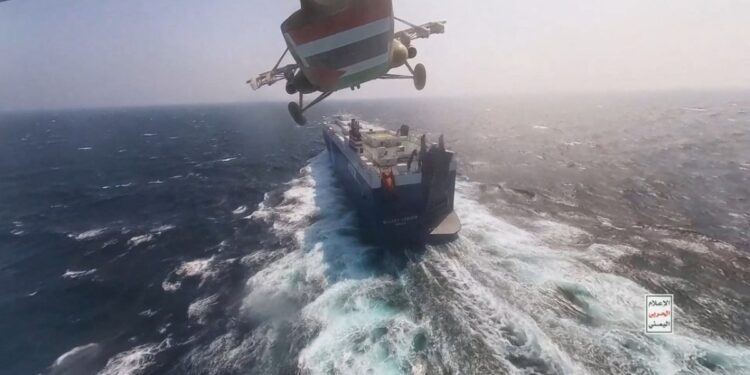Container shipping ships bringing goods to Israel, including shoes, clothing, furniture and electrical goods, used to enter the Bab al-Mandeb Strait into the Red Sea and from there to the port of Eilat in Israel, or the Egyptian Suez Canal and then to the port of Ashdod or Haifa.
Today, in light of the war on the Gaza Strip and the threats of the Houthi group in Yemen to target ships heading to Israel from Bab al-Mandab, ships heading to Israeli ports must circumvent Africa to reach Israel through the Strait of Gibraltar in northern Morocco.
The head of the Suez Canal Authority, Lieutenant General Osama Rabie, said in a statement today that 55 ships have diverted to the Cape of Good Hope route since November 19.
The alternative shipping route through the Red Sea increases the sailing time of ships bound for Israel by between 17 days and 22 days, causing the cost of shipping and commodity prices to rise and even postpone some Israeli deals, transactions and trade exchanges.
Exports and imports
According to data from the Israeli Ministry of Economy, the value of Israeli exports last year exceeded $166 billion, and is rising 10% compared to 2021.
38% of Israeli goods found their way to European markets, while 35% of them were exported to countries in America, and 24% to Asia, the rest was exported to Africa and Ukraine, according to official Israeli data.
Israeli exports of goods to the United States increased by 19% over the past year on an annual basis, and they also increased to Britain by 113%, to Brazil by 90%, to India by 39%, and to Turkey by 17%.
On the other hand, the value of merchandise imports in 2022 amounted to about $107.7 billion, an increase of 16.9% compared to 2021.
The volume of trade exchange with Israel constituted 34.6% of the gross domestic product in 2022, as the value of exports reached 73.8 billion dollars, while imports recorded 107.2 billion dollars.
Data and data from the Navigation and Ports Authority of the Israeli Ministry of Transportation indicate that in 2022, Israeli ports unloaded goods weighing 40.6 million tons, while goods weighing 18.2 million tons were loaded abroad.
Threat and paralysis
In the wake of the Houthi group’s threats and the prevention of ships heading to Israel from sailing through Bab al-Mandab, the port of Eilat has been hit by a state of commercial paralysis, according to the port’s executive director, Gideon Golber, adding, “Cars will no longer arrive, and we will lose the rest of the ships, as we export chemicals from it.”
The Marker newspaper quoted Golper as saying, “The closure of the Strait of Tiran actually caused two wars, the first in 1956 (the tripartite aggression against Egypt) and the 1967 war (the setback),” adding that the Houthis cannot be allowed to block the sea shipping route to Israel, and that “the port Eilat is one of Israel’s most vital interests.”
Importers suffer from uncertainty and high shipping costs, but Golber says of the port of Eilat, which depends on the movement of ships in the Red Sea, “Its movement can be completely paralyzed due to the security situation. The small port in Eilat is responsible for only 3% of the total movement of goods in Israel.” “But it is the largest port for importing cars, as 44% of all vehicles arriving in Israel reach it.”
Decline and rise
Palestinian businessman Muhammad al-Jassar said that the sea shipping route for various cargo ships from China and India to Israel via the Red Sea and the Suez Canal generally takes 3 weeks, and closing Bab al-Mandab would greatly affect Israeli trade exchange.
He pointed out that the alternative route to the Red Sea is for ships to head to the Strait of Gibraltar, which will increase the time period for shipping to about 6 weeks.
Speaking to Al Jazeera Net, Al-Jassar pointed out that this will raise the price of one container from 1,500 to 3,000 dollars, in addition to the increase in insurance companies’ policies due to regional threats and the risks of war on the Gaza Strip and its repercussions on the economy in Israel.
Cost and losses
In a reading of the repercussions of the Houthi group’s threats, political economist Mtanes Shehadeh told Al Jazeera Net that this led to an increase in the prices of various goods, including basic food supplies, due to the lack of goods in the market due to the rise in the cost of sea freight.
He explained that the new reality of maritime shipping in Bab al-Mandab exacerbates the economic crisis, and inflicts additional losses on Israel in addition to its losses as a result of the war on Gaza, considering that closing Bab al-Mandab to ships heading to Israel is a strategic blow to commercial transactions, as alternatives to maritime shipping are very expensive and the economy cannot The Israelis can bear it in the long term.



